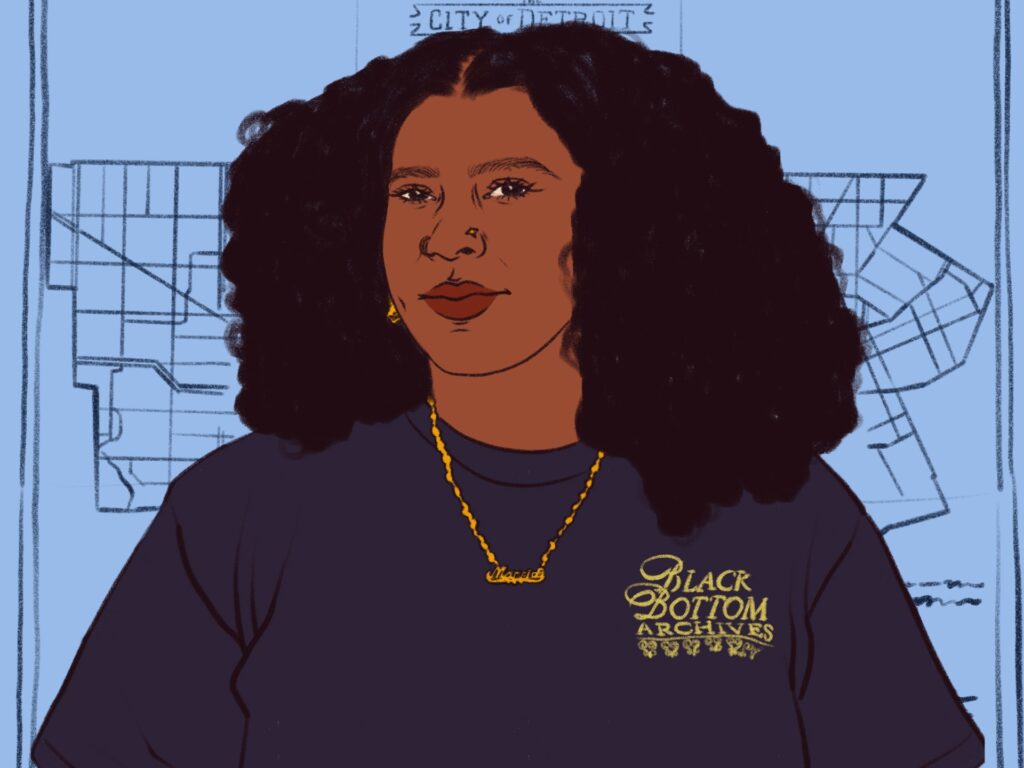Marcia Black grew up in Detroit with a village surrounding her. Now, it’s that village — and their collective memory — that she honors through her work.
“A lot of those folks who have poured into me agree that Black Detroit deserves better,” she says.
“A lot of those folks who have poured into me agree that Black Detroit deserves better.”
Now as the executive director of Black Bottom Archives, (a project of Allied Media Projects), Black’s mission is to preserve the history of the once-thriving neighborhood from which the organization takes its name. Black Bottom Archives, formed in 2015, is a living community archive dedicated to sharing and preserving Black Detroit stories. This has looked like documenting and creating greater awareness of the area that was a birthplace of Black Detroit culture and once had the highest concentrations of Black migrants from the South.
Black Bottom was one of a few neighborhoods where racial covenants and red-lining maps allowed Black people — as well as other ethnic minorities — to live in the city. Its adjacent business district, Paradise Valley, contained hundred of Black-owned establishments including Black-owned hotels, lounges, restaurants and other establishments, quickly attracting touring Black entertainers and other celebrities who were largely restricted from white-owned establishments, and employed locals who went on to become foundational in the success of Motown Records and other endeavors.
Urban renewal projects spread across U.S. cities in the 1960s and 1970s, and the reshaping and modernizing largely came at a cost to Black neighborhoods. Black Bottom and Paradise Valley were not spared; much of the two districts were obliterated to make way for the I-375 connector highway and or a public park.
Black came into her post in 2022, just as the organization was beginning to expand. “I had experience being an organizer, being an archivist, and a commitment to do the best I can.”
Where Black didn’t have experience was fundraising, but that didn’t deter her. Nor did it remain an undeveloped skillset for very long. She was able to translate the community-building she learned growing up in the city into networking and surrounding herself with folks who not only taught her the ropes but wrote her the checks. Today, Black Bottom Archives has transitioned from a volunteer organization to one that can pay its full staff.
Black Bottom Archives doesn’t just live in the past. Black and the organization have taken an active role in a new plan to fill in the I-375 trench, making sure the history of the demolished districts isn’t lost in the shuffle — particularly as more and more former residents are aging and passing on. Black is a member of the “Reparative Roundtable,” a group hosted by Kresge’s Detroit Program that includes stakeholders who collect feedback from Detroit residents, particularly descendants of those displaced from the once-thriving neighborhoods.
“Through relationship building, we were able to carve out a task force to contribute more to the conversation, and make sure we’re pulling in folks who were able to repair the harm done to Black folks in Detroit,” she says.
A key part of Black’s activism is gathering the oral histories of elder Black Detroiters who were part of the Black Bottom and Paradise Valley communities, who are happy to share their stories.
“There’s a culture of mentorship with Black Detroiters,” she says. “Generosity comes through showing up and being willing to do something, experimenting with someone new, investing in youth and new generations of leadership.”
“Generosity comes through showing up and being willing to do something, experimenting with someone new, investing in youth and new generations of leadership.”
What makes Black a pathbreaker is being a young person carrying on traditions from prior generations – and educating her peers to do the same.
“I think more and more of what we’re growing into is a hub for Black Detroiters to preserve our history, celebrate our history,” she says. “This idea of Black Detroit history being preserved is possible because our past, present, and future generations will have each e played a role in it.”




